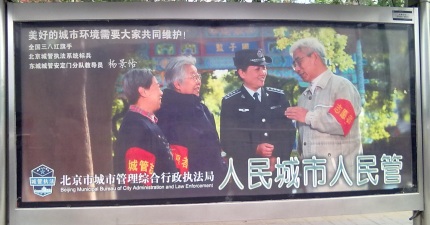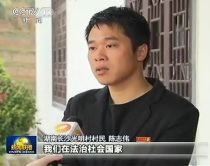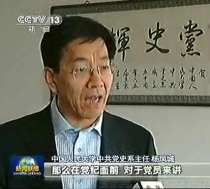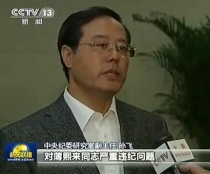Insecure governments are much like insecure people. They overcompensate for their weaknesses by making a big fuss about how strong they actually are in those areas. For instance, if you’re an ashamed closet homosexual, then you might become an Evangelical anti-gay crusader. Likewise, if you’re an authoritarian government that operates on the whims of un-elected leaders, you might stress how adherent you are to the “rule of law” again and again and again and again. So if you want to see what the Chinese government is insecure about, you usually need look no further than the propaganda.
All over China you see slogans like “Happy Guangdong” or “Civilized Chaoyang” that call attention directly to what leaders feel those places are lacking. And chengguan – the city management officers responsible for stopping illegal street vendors – have an often-deserved reputation as being thugs who use their little power to terrorize poor migrants. So all over Beijing we see signs like this:
With this principle in mind, I’ve been watching Xinwen Lianbo over the past few weeks. This is CCTV’s flagship news program that runs simultaneously on most channels every evening at 7:00. This program most consistently reaches the largest viewership throughout China, so it’s perfect for gauging the government’s biggest insecurities.
The program’s traditional schedule is widely recognized and mocked by Chinese. It consists of three segments: The leaders are busy, the people are happy, and foreign countries are in chaos. I vaguely recall when I first got to China in 2007, you could almost set your watch to it most days. When images of top leaders shaking hands with foreign diplomats or doing countryside field inspections shifted into minorities and peasants enjoying favorable government policies, it must be 7:10. When those happy faces faded into American gun violence or Middle-East bombings, it must be about 7:20.
These three segments can be seen as compensation for the Communist Party’s three biggest fears: That the leaders might be seen as illegitimate, corrupt and self-indulgent; that the peasants and minorities might feel exploited or repressed; and that countries under different political systems might be viewed as preferable alternatives.
What I’ve found interesting from watching the program over the past few weeks – and ticking off the kinds of stories that are shown – is that the traditional format has been shaken up. To its credit, individual stories are now more diverse and often contain news without apparent political aims. However, the “leaders are busy” portion now often stretches out 15-20 minutes of the 30 minute newscast, with an average of 5 separate stories each program. This might suggest the leadership is REALLY keen on proving its legitimacy as the power handover draws near.
The “people are happy” and “foreign countries are in chaos” segments are also still cornerstones, with an average of 2.3 and 3.6 stories respectively each night. But two other segments seem to have become regular additions: “China is innovative” and “the economy is looking good.”
Each have been averaging one story per night. Chinese innovations like an aerospace medical lab and the world’s quietest washing machine are shown; as are detailed explications (often digressing into virtual PowerPoint presentations) leading you to feel that China’s economy is strong and will stay strong.
China is facing some major economic bubbles, coupled with bleak growth prospects if its businesses can’t move up the value chain while wages increase. The Chinese education system’s failure to produce the creativity needed to do so has been a concern for years. If, and how badly the bubbles will burst, and whether or not China can get creative, remain to be seen. But if Xinwen Lianbo is any indication, they’re things the government is pretty worried about.





